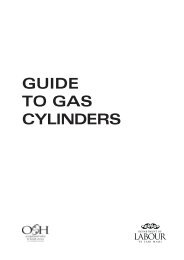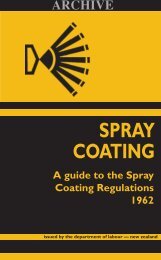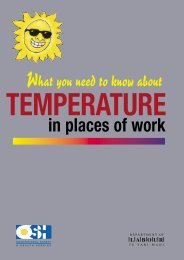Underground Petroleum Storage Tanks and Related Wastes - Code ...
Underground Petroleum Storage Tanks and Related Wastes - Code ...
Underground Petroleum Storage Tanks and Related Wastes - Code ...
You also want an ePaper? Increase the reach of your titles
YUMPU automatically turns print PDFs into web optimized ePapers that Google loves.
Inspector, Inspectors of Dangerous Goods employed by the Occupational Safety<br />
<strong>and</strong> Health Service of the Department of Labour, <strong>and</strong> by local licensing<br />
authorities.<br />
6.12 Intrinsically Safe<br />
Certified “intrinsically safe” by an authority approved for this purpose by the<br />
Chief Electrical Inspector, Ministry of Commerce.<br />
6.13 Licensing Authority |<br />
A licensing authority within the meaning of section 7 of the Dangerous Goods Act<br />
1974 <strong>and</strong> its subsequent amendments. |<br />
6.14 Local Authority or Territorial Authority<br />
A City Council, Regional Council, District or Community Council, <strong>and</strong><br />
includes any other public body which the Department of Labour has declared by<br />
notice in the Gazette to be a local authority for the purposes of the Dangerous<br />
Goods Act 1974. |<br />
6.15 Principal<br />
The person or company that contracts to have the work carried out on its behalf.<br />
6.16 Product<br />
Any petroleum product, including Class 3 Dangerous Goods in liquid or vapour<br />
form.<br />
6.17 Project Engineer<br />
The person who is to administer the contract between the contractor <strong>and</strong> the<br />
principal on behalf of the principal. In most cases, the project engineer will be an<br />
employee of the principal. However, the principal may engage a third party to<br />
administer the works.<br />
6.18 Shall, Must, Should, <strong>and</strong> May<br />
The words “shall” <strong>and</strong> “must” are to be understood as m<strong>and</strong>atory <strong>and</strong> the word<br />
“should” as advisory. The word “may” means that discretion can be used.<br />
6.19 Source of Ignition<br />
Any agency capable of igniting a flammable gas, vapour or other combustible<br />
substance, <strong>and</strong> includes, but is not limited to, a fire, flame, spark, fuel lamp <strong>and</strong><br />
any electrical equipment of a type not approved for use in the particular location<br />
where a flammable gas or vapour or combustible substance is or may be present.<br />
(See also 6.8 <strong>and</strong> 6.10.)<br />
6.20 Tank/Vessel<br />
Any container having a water capacity of 250 litres or more.<br />
6.21 Vapour Testing Equipment (Explosimeter)<br />
Portable instruments used to detect the presence of flammable vapour in air.<br />
Vapour testers used must be specifically designed <strong>and</strong> calibrated to detect the<br />
explosive range of the flammable vapours of the particular substance or substances<br />
likely to be encountered. Vapour testers are designed for a normal range of<br />
operation, <strong>and</strong> one instrument is likely to detect vapour for only a small number of<br />
products at ambient temperatures.<br />
Transport <strong>and</strong> Disposal of <strong>Petroleum</strong> <strong>Storage</strong> <strong>Tanks</strong> 7





